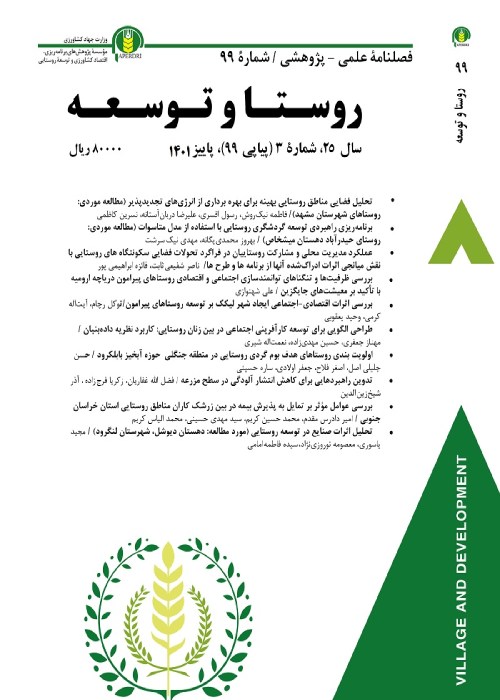Investigating Reduction Labor Employment Quality due to the COVID-19 Pandemic in Rural Areas of Hormozgan Province
The Covid-19 pandemic has posed numerous challenges to the global economy. Due to the pandemic and the resulting restrictions, many job opportunities have been lost, and lots of businesses have suffered. Given the sensitivity of the rural economy sector to impact of the pandemic outbreak, particularly on the rural labor market, the aim of this study is to investigate decline in quality of labor employment in rural areas of Hormozgan province caused by the pandemic. In recent years, one of Iran's fundamental issues has been the underdevelopment of rural areas and the consequent migration of villagers to urban centers. This migration is primarily driven by economic factors, particularly limited employment opportunities. Employment is one of the effective and important categories in rural development, which has always received attention.
The study's research design is practical in purpose and semi-experimental in implementation. This research employed a questionnaire consisting of 10 dimensions and 38 items to investigate the decline in the quality of labor employment. The questionnaire was designed based on previous research, theoretical foundations, and expert opinions in the field. The Cronbach's alpha for the questionnaire was 0.77. The obtained information was analyzed using descriptive statistics and structural methods with SPSS and PLS software. The statistical population of this research comprises all active labor force in the rural areas of Hormozgan province in 2021. The cluster sampling method was used, and the sample size was 311 people. The samples were collected from service, agricultural, and industrial jobs in 12 cities in Hormozgan province.
The research findings indicate that the COVID-19 pandemic has impacted the quality of employment in rural areas of Hormozgan province. Addressing these challenges will require significant efforts at both the provincial and national levels. The research results indicate that the average employment quality degradation score in the sample was 3.430. This score, on the 5-point Likert scale, suggests a worrying degradation of employment quality in rural areas of Hormozgan province due to the spread of Covid-19. The findings show that the COVID-19 pandemic has impacted all 10 dimensions of employment quality in rural areas. The dimensions most affected were 'suitable working hours', 'employment opportunities', and 'social and economic fields', while the dimensions of 'safe work', 'unacceptable work', and 'social discourse' experienced the least decline in quality.
The data indicates a significant disparity in job quality between genders, with men experiencing higher job quality than women following the Covid-19 outbreak. Additionally, there is a notable decline in employment quality among certain age and education groups. Specifically, those under 20, between 21 and 30, and over 51 years old have experienced the greatest decline in employment quality. People with lower educational qualifications and incomes experienced a greater decline in employment quality; this issue should be taken into consideration when developing support policies post-COVID-19. The analysis indicates that the spread of Covid-19 has resulted in a lack of employment opportunities, forcing workers to accept unacceptable working conditions. Additionally, the unfavorable socio-economic conditions resulting from the pandemic have led to a situation where people have no choice but to work under such conditions.
Supporting the rural labor force is a duty of governments and their economic, political, and social representatives. This requires national determination, political will, and prioritizing strategies that aim to develop the rural economy in the country. The cultural and behavioral gap between the rural and urban labor force has resulted in the failure of the rural labor environment to implement laws and develop rights and benefits. This gap may cause problems for the efficiency of the rural labor force; however, a relative moderation can be achieved. To prevent the negative impact of Covid-19 on the quality of employment in rural areas, various countries are implementing measures to address current and future challenges; It is recommended to prioritize strategies that improve the employment environment and labor force welfare. Improving the rural business environment in the post-Covid-19 era can enhance employment opportunities in the province. Rural activists comprehend the significance and advantages of support programs; this work showcases the resources qualitatively and operationally.
- حق عضویت دریافتی صرف حمایت از نشریات عضو و نگهداری، تکمیل و توسعه مگیران میشود.
- پرداخت حق اشتراک و دانلود مقالات اجازه بازنشر آن در سایر رسانههای چاپی و دیجیتال را به کاربر نمیدهد.


